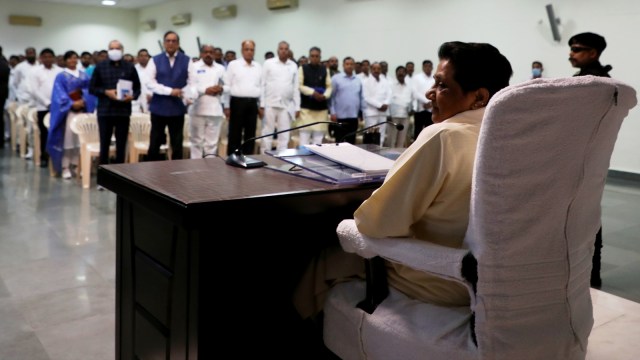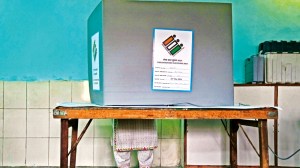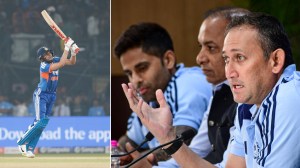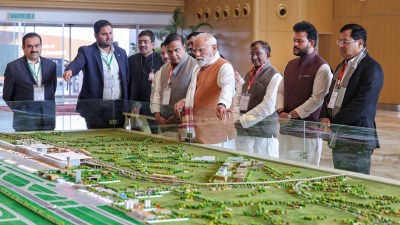Mayawati’s 2027 poll maths: MBCs+Dalits to give more returns than Muslims+Dalits
In the present political landscape, the party leadership believes that an alliance between MBCs and Dalits holds greater electoral potential for the BSP than the traditional Dalit-Muslim equation.
 BSP chief Mayawati at a meeting of party leaders and office-bearers in Lucknow on Tuesday. (Express photo by Vishal Srivastav)
BSP chief Mayawati at a meeting of party leaders and office-bearers in Lucknow on Tuesday. (Express photo by Vishal Srivastav)AFTER FAILING to secure winning results from its traditional votebank of Muslims and Dalits in the 2022 Assembly and 2024 Lok Sabha elections, the Bahujan Samaj Party (BSP) has now begun preparations for the 2027 Assembly polls by shifting its focus to the Most Backward Classes (MBCs) and working to bring them into the party ranks.
In the present political landscape, the party leadership believes that an alliance between MBCs and Dalits holds greater electoral potential for the BSP than the traditional Dalit-Muslim equation.
The BSP is focusing on MBCs because, along with Dalits, they make up a larger voter base than Muslims and Dalits in Uttar Pradesh — Dalits account for over 20 per cent of the state’s population, while OBCs make up around 40. The Muslim community accounts for nearly 20 per cent of the state population.
The party has appointed two sahyojaks (conveners) in each district of UP — one from the SC community and one from the OBC community. The district-level Sahyojaks will appoint two Sahyojaks at the Vidhan Sabha level — one from the SC community and one from the OBC community. Their role will be to reach the village level and inform people about the work done by the BSP during its tenure in the state government: In 1995, 1997, 2002 and 2007.
The BSP has implemented this strategy to foster collaboration between the Scheduled Caste (SC) and Other Backward Communities (OBC) communities from the district to the village level while also reinstating leadership roles for MBC members at the local level in the state.
This effort to woo OBCs follows the recent efforts by the BJP and the Congress announcing their district president lists, where they allocated significant representation to the OBC community. The ruling BJP appointed 70 out of 98 district and city unit chiefs, with the majority coming from the OBC community (26) and Brahmins (20). Additionally, 18 leaders were chosen from Thakur, Bhumihar, Kayastha, and Vaishya communities. Meanwhile, the Congress appointed city and district presidents for 75 districts, distributing positions among OBCs (34), Muslims (31), Scheduled Castes (18), and one from the Scheduled Tribe community.
On Tuesday, BSP president Mayawati convened a state-level meeting in Lucknow to launch a strong campaign to unite all sections of the ‘Bahujan Samaj’ into a powerful political force through “mutual brotherhood”, said a party leader.
BSP’s state president, Vishwanath Pal, said in the meeting that Mayawati outlined guidelines for all Sahyojaks from 76 districts on how to bring more members of the OBC community into the BSP fold.
They were instructed on organising meetings at various levels, including village gatherings with the OBC community. Their role is to inform people about the BSP and encourage new memberships.
Party sources said they would explain to the public about the works the party done during its rule. A major initiative was the creation of the UP Backward Classes Welfare Department—the first in the country separate from the Social Welfare Department, with a dedicated budget. The state also formed the UP State Backward Classes Commission and set up the Backward Classes Welfare Directorate. The BSP said that its government introduced several “pioneering welfare schemes” aimed at uplift of the poor, backward, and the marginalised Bahujan communities.
Other initiatives included government schemes such as marriage assistance and healthcare support for daughters of OBC families, along with computer training programmes for unemployed OBC youths to improve job prospects.
Pal also said that it was decided in the meeting to celebrate Dr B R Ambedkar’s birth anniversary on April 14 by organising Vichar Sanghosti (Ideological Seminar) at the district level through seminars and discussions. Party members from Lucknow will gather at the Dr B R Ambedkar Memorial in Lucknow, while those from the Meerut division (Western UP) will visit the National Dalit Inspiration Site in Noida to pay their tributes.
Since losing power in 2012, the BSP has seen its OBC support shift towards regional parties, the BJP, and the Samajwadi Party. The party now recognises that Dalit votes alone are not enough to regain power and is actively working to rebuild its OBC support base.
The BSP is now making a “determined effort to regain power”, as it struggles with a sharp decline despite being the leading political force for Dalits in UP. Despite its loyal voter base, the party currently holds no Lok Sabha seats. In the 2024 general elections, it managed just 2.06 per cent of the national vote despite contesting 488 of 543 seats. Its downfall was also evident in the 2022 Assembly elections, where it secured only one seat with a 12.88 per cent vote share. However, before 2002, influential OBC groups such as Mauryas, Sainis, Rajbhars, Kushwahas and Kurmis were aligned with the BSP and had government representation.
However, the party decided to change its strategy also due to recent turmoil after Mayawati expelled her nephew, Akash Anand, whom she had once named as her political heir. Mayawati elaborated on her decision by claiming that Anand had “come under the influence” of his father-in-law, Ashok Siddharth, a former Rajya Sabha MP. She also made it clear that she would not name a successor “during her lifetime.”







